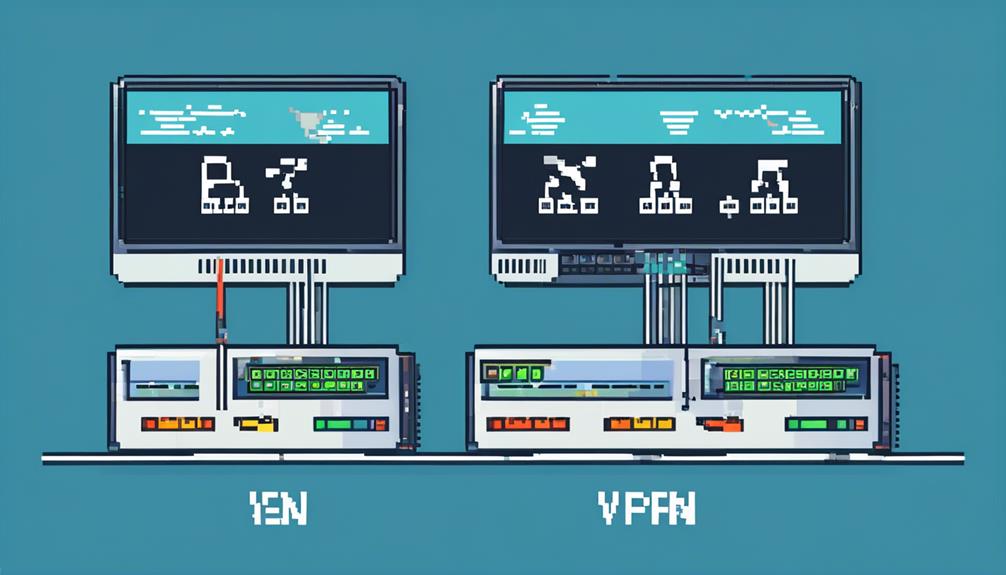In today's digital landscape, the need for secure connections has become paramount for organizations of all sizes. VPN hardware, or Virtual Private Network hardware, offers a robust solution that ensures the confidentiality and integrity of data transmitted over networks.
But what exactly is VPN hardware and how does it work? In this discussion, we will explore the benefits of using hardware VPNs, compare them to software solutions, and delve into considerations such as speed, locations, and compatibility.
By understanding the intricacies of VPN hardware, businesses can make informed decisions to safeguard their sensitive information and maintain secure connections. So, let's embark on this journey into the realm of VPN hardware and discover the keys to enhanced network security.
Key Takeaways
- VPN hardware provides a higher level of security compared to software solutions and is utilized by large businesses and organizations.
- Hardware VPNs offer scalability and performance advantages, centralized management, and efficient data encryption and decryption for faster transmission speeds.
- The choice between hardware and software VPNs depends on specific requirements and priorities, with hardware VPNs offering higher security and performance, while software VPNs provide flexibility and compatibility.
- Factors to consider in choosing VPN hardware include device compatibility, performance and speed, scalability and expansion options, and price considerations.
What Is VPN Hardware?

VPN hardware is a physical device that enables access to a private network and is commonly utilized by large businesses and organizations. It provides secure connections by establishing a virtual private network (VPN) through the use of hardware components. Unlike VPN software, which relies on software applications to establish the connection, VPN hardware uses dedicated devices to ensure a higher level of security.
The components of VPN hardware include a VPN gateway, network interface cards, an encryption/decryption engine, a network switch, redundancy and high availability features, a management interface, authentication mechanisms, additional security features, and a load balancer. These components work together to establish a secure connection between remote users and the private network.
One of the key benefits of using hardware VPN solutions is the high level of security they provide. With dedicated devices and encryption capabilities, hardware VPNs offer a robust security framework that is difficult to breach. Additionally, hardware VPNs offer scalability and performance advantages. They can handle a large number of VPN tunnels, allowing for increased capacity as the organization grows.
Another advantage of using hardware VPN solutions is centralized management. With a dedicated management interface, administrators can easily configure and monitor the VPN connections, ensuring that security policies are enforced consistently.
However, it's important to note that hardware VPNs have limitations. They have a limited number of VPN tunnels, which means that additional devices may need to be purchased as the organization expands. Additionally, setting up and maintaining hardware VPN solutions require specialized technical knowledge and can be costly in terms of time and finances.
Benefits of Hardware VPNs
With their dedicated processing power and resources for encryption operations, hardware VPNs offer a high level of security that is difficult to breach. These devices are specifically designed to handle the encryption and decryption of data, ensuring that sensitive information remains secure during transmission over a network.
One of the key benefits of hardware VPNs is their scalability and performance. As network demands increase, hardware VPNs can effectively handle the additional load without compromising security. This makes them an ideal solution for organizations that require secure connections for a large number of users or devices.
Another advantage of hardware VPNs is centralized management. With a hardware VPN, administrators can easily control and monitor the network from a central location. This simplifies the management process, allowing for efficient configuration and troubleshooting, and ensuring that the network is secure and functioning optimally.
In addition to their security and management benefits, hardware VPNs also provide increased performance. The dedicated processing power of these devices ensures efficient data encryption and decryption, resulting in faster transmission speeds and reduced latency. This is particularly important for organizations that need to transfer large amounts of data securely and quickly.
VPN Hardware Vs. VPN Software

When considering VPN hardware versus VPN software, one of the key factors to consider is the level of security and performance.
VPN hardware offers a high level of security through dedicated hardware resources for encryption operations, while also providing increased performance with dedicated processing power.
On the other hand, VPN software offers flexibility and compatibility with various operating systems, making it easier to use and upgrade without the need for specialized technical knowledge.
Ultimately, the choice between hardware and software depends on the specific requirements and priorities of the organization or individual.
Hardware Vs. Software
Hardware and software are two distinct approaches to implementing virtual private networks (VPNs), each with its own set of advantages and considerations.
When it comes to hardware VPNs, they offer a physical device that provides access to a private network, commonly used by large businesses and organizations.
On the other hand, VPN software is an application or program that enables secure and encrypted connections, offering flexibility, compatibility with various operating systems, and support for versatile VPN protocols.
- Hardware VPNs:
- Robust protection and private access
- Requires technological expertise, time, and finances to set up for home use
- Software VPNs:
- Flexibility and compatibility with various operating systems
- Support for versatile VPN protocols
Both hardware and software VPNs have their own strengths and considerations, and the choice between the two depends on factors such as the level of security required, scalability and performance needs, centralized management preferences, and budget constraints.
Security and Performance
In terms of security and performance, the implementation of VPN hardware and VPN software present distinct advantages and considerations. Hardware VPNs, also known as VPN hardware devices, offer high levels of security and performance due to their dedicated devices and resources for encryption operations. They provide robust protection and private access, making them ideal for organizations that require secure remote access and site-to-site VPN support. However, setting up and maintaining hardware VPNs can be complex and costly, requiring technological expertise and financial investment. On the other hand, VPN software is easy to download and use, less expensive, and supports versatile VPN protocols. While software VPNs may not offer the same level of performance as hardware VPNs, they are preferred by individual users and smaller to medium-sized businesses. Additionally, they receive regular automatic updates from the provider, ensuring security and compatibility. The table below summarizes the key differences between hardware VPNs and software VPNs.
| Hardware VPNs | Software VPNs |
|---|---|
| High levels of security | Easy to download and use |
| Dedicated devices and resources | Less expensive |
| Complex setup and maintenance | Supports versatile VPN protocols |
| Suitable for organizations with secure remote access needs | Preferred by individual users and smaller to medium-sized businesses |
| Requires technological expertise and financial investment | Regular automatic updates from the provider |
| Offers site-to-site VPN support | May not offer the same level of performance as hardware VPNs |
| Centralized management | – |
Speed Comparison
The data transfer rates of hardware VPNs surpass those of software VPNs due to their dedicated processing power and hardware resources. This makes hardware VPNs the preferred choice for those seeking faster speeds in their secure connections.
Here is a comparison of the speed capabilities between hardware VPNs and software VPNs:
- Hardware VPNs:
- Dedicated processing power: Hardware VPNs are equipped with dedicated processors designed specifically for handling VPN traffic. These processors are optimized for encryption and decryption tasks, allowing them to process data at high speeds.
- Hardware resources: Hardware VPNs have dedicated hardware resources such as memory and network interfaces. These resources are solely dedicated to VPN operations, enabling faster data transfer rates.
- Software VPNs:
- Shared processing power: Software VPNs rely on the processing power of the underlying operating system. This shared processing power may be limited, leading to lower data transfer rates compared to hardware VPNs.
- Limited hardware resources: Software VPNs use the resources available on the host device, which may be shared with other applications. This can result in slower speeds as the resources are not dedicated solely to VPN operations.
When it comes to speed comparison, hardware VPNs outperform software VPNs due to their dedicated hardware resources and processing power. This allows hardware VPNs to handle high data transfer rates efficiently, making them ideal for users who require fast and secure connections. In contrast, software VPNs may experience slightly lower data transfer rates due to their reliance on shared resources.
Therefore, if speed is a crucial factor in your VPN requirements, opting for a hardware VPN would be the recommended choice.
Locations Comparison

When comparing VPN locations, there are several important points to consider.
Firstly, the speed and performance of the VPN connection is crucial, as it directly affects the user experience.
Additionally, data privacy laws vary from country to country, so it is essential to choose a location that offers strong legal protection for sensitive information.
Lastly, the availability of servers in different locations is important for ensuring a reliable and accessible VPN service.
Speed Vs. Security
To compare the speed and security of different VPN locations, a detailed analysis of hardware and software VPNs is necessary.
When it comes to speed, hardware VPNs have the advantage of dedicated processing power, allowing for faster encryption and decryption of data. On the other hand, software VPNs may have slower speeds due to the reliance on the host computer's resources.
In terms of security, hardware VPNs offer a higher level of protection due to their dedicated hardware and encryption capabilities. Software VPNs, while still secure, may be more susceptible to vulnerabilities in the underlying operating system or software.
It is important to consider these factors when choosing between hardware and software VPN options, as both speed and security are crucial for establishing secure connections.
Data Privacy Laws
Given the importance of considering both speed and security when choosing between hardware and software VPN options, it is crucial to also examine the data privacy laws in different locations.
Data privacy laws vary by location, with some regions having stricter regulations than others. For example, the European Union's General Data Protection Regulation (GDPR) has stringent data protection requirements, while the California Consumer Privacy Act (CCPA) provides privacy rights to California residents, impacting how businesses handle personal information. Other regions, such as Canada, Australia, and Brazil, also have their own data privacy laws with specific compliance requirements.
Understanding the variances in data privacy laws across different locations is essential for businesses operating in multiple jurisdictions. Implementing a hardware VPN solution can help ensure secure connections for remote users, as the physical device provides encrypted connections that comply with data privacy laws.
Server Availability
Server availability is a crucial consideration when comparing VPN hardware, as it determines the geographical locations from which users can access the VPN. Evaluating server availability involves comparing the global distribution of servers, ensuring that the hardware VPN device can provide secure connections from multiple locations worldwide.
Here are two key factors to consider when comparing server availability:
- Global Distribution: Different VPN hardware providers may offer varying server locations, impacting the accessibility and performance of the VPN connection for users in different regions. The proximity and number of servers in specific regions can affect connection speeds and user experience.
- Site-to-Site VPN Support: Organizations with international operations or multiple remote locations require VPN hardware that supports site-to-site VPN connections. This capability ensures secure communication between different branches or offices, enhancing data protection.
Setup, Maintenance, and Updates

Setting up, maintaining, and updating a hardware VPN requires a manual configuration process that demands technological expertise, time, and financial investment, particularly for home use. The setup of a hardware VPN involves manually configuring the devices to establish a secure connection. This process requires knowledge of networking protocols, IP addressing, and encryption algorithms. It can be complex and time-consuming, especially for individuals without technical expertise.
Once the hardware VPN is set up, maintenance tasks become an essential part of ensuring its secure operation. Maintenance may include regular firmware updates to address security vulnerabilities and improve performance. IT administrators are responsible for applying these updates and patches to keep the hardware VPN up-to-date.
In addition to firmware updates, hardware VPNs may require periodic hardware component replacements due to wear and tear or technological advancements. This involves replacing outdated hardware with newer models to maintain optimum performance and security.
Monitoring the network is another crucial aspect of hardware VPN maintenance. IT administrators need to monitor the VPN tunnels, traffic, and network performance to identify any potential issues or security breaches. This proactive approach helps in detecting and resolving problems before they affect the network's security or performance.
Contrastingly, software VPNs require minimal end-user maintenance. Updates and bug fixes are typically handled by the provider, ensuring that the software VPN remains secure and up-to-date. The provider regularly releases automatic updates to address security issues and improve performance.
Remote Access Capabilities
After discussing the setup, maintenance, and updates of hardware VPNs, it is important to address their remote access capabilities.
Hardware VPN devices are designed to provide secure access to a private network from remote locations. Here are some key aspects of their remote access capabilities:
- Secure Connections:
- Hardware VPNs ensure secure connections by establishing encrypted tunnels between the remote user and the VPN server. These tunnels protect data from interception and unauthorized access.
- The VPN device uses advanced encryption algorithms to encrypt the data transmitted over the internet, ensuring the confidentiality and integrity of the communication.
- Remote Access to the Network:
- Hardware VPNs enable remote employees to securely access the company's intranet from anywhere in the world. This allows them to work remotely while still having access to the resources and applications they need.
- Remote access is facilitated through the use of VPN clients installed on the remote user's device. These clients establish a connection with the VPN server, providing a secure pathway for data transmission.
- Centralized Management:
- Hardware VPNs offer centralized management capabilities, allowing network administrators to control and monitor remote access to the network. This includes managing user permissions, enforcing security policies, and monitoring network traffic.
- Administrators can easily add or remove remote users, configure access rights, and ensure compliance with security protocols.
Hardware VPNs provide a robust solution for secure remote access to private networks. With their secure connections and remote access capabilities, they enable employees to work from remote locations while maintaining the confidentiality and integrity of their communication.
Scalability of Hardware VPNs

The scalability of hardware VPNs is a crucial factor to consider when implementing a VPN solution.
Hardware VPNs offer expansion options that allow businesses to accommodate a growing number of users and connections without sacrificing performance.
With the ability to handle a larger number of VPN tunnels, hardware VPNs provide the capacity needed for organizations with evolving connectivity needs.
Hardware VPN Limitations
Hardware VPNs face limitations in scalability due to their fixed number of VPN tunnels. This necessitates additional devices as the network expands. This can create challenges and complexities when adding more users or locations to a hardware VPN. The expansion may require specialized technical knowledge and expertise for upgrading and managing multiple devices.
As the number of users and connections increases, hardware VPNs may struggle to efficiently accommodate the growing demands of an organization. This can potentially lead to performance issues, impacting the secure connectivity and data protection provided by the VPN hardware device. To maintain optimal performance and privacy, organizations may need to invest in additional VPN servers or consider alternative solutions that offer greater scalability.
Expansion Options for VPN
Expanding the capabilities of hardware VPNs to meet the growing demands of an organization requires careful consideration of scalable options that can efficiently accommodate increased user access and network connectivity.
One option is to add more hardware VPN servers to support the growing number of VPN tunnels required. This allows for an increase in the number of users and network connections that can be supported. However, scaling hardware VPNs may require specialized technical knowledge to integrate and manage additional devices effectively.
Businesses should also consider selecting devices with built-in redundancy and failover features to ensure continuous and uninterrupted service.
Hardware VPN Capacity
To ensure the effective scalability of hardware VPNs, it is crucial to evaluate their capacity to handle increasing numbers of VPN tunnels and connections. The hardware VPN capacity refers to the device's ability to support a large number of devices and provide a high level of security for the secure network.
When evaluating the capacity of a hardware VPN device, two key factors come into play:
- Concurrent connections: Hardware VPN devices should be able to handle a significant number of simultaneous VPN connections to accommodate the growing demand for secure connections.
- VPN throughput: The device's VPN throughput determines the amount of data that can be transmitted securely over the VPN tunnels. It is essential to ensure that the hardware VPN device can handle the required data traffic.
In addition, hardware VPN devices that support site-to-site VPN with Ethernet connectivity can further enhance the scalability and flexibility of the network.
Price Considerations for VPN Hardware

When considering the price of VPN hardware, it is important to take into account the initial investment, ongoing maintenance costs, scalability expenses, specialist setup requirements, and the overall total cost of ownership.
VPN hardware, such as a hardware VPN device, provides secure connections for small businesses seeking data protection and privacy.
The initial investment for VPN hardware is typically higher compared to software solutions. This is due to the cost of purchasing the hardware devices themselves. However, hardware VPNs offer better security and performance than software-based alternatives, making them a worthwhile investment for organizations prioritizing data protection.
Ongoing maintenance costs are another price consideration for VPN hardware. Regular firmware updates are necessary to address security vulnerabilities and ensure optimal performance. In addition, hardware replacements may be required over time, adding to the overall maintenance expenses. Network monitoring tools and personnel may also be needed to ensure the VPN is functioning properly and to promptly address any issues that arise.
Scalability costs should also be taken into account. As businesses grow and require more VPN connections, additional hardware devices may need to be purchased. This can result in additional expenses, as well as the need for specialist setup to configure the new devices and ensure seamless integration with the existing network infrastructure.
Considering the total cost of ownership is crucial when evaluating the price of VPN hardware. This includes not only the initial investment and ongoing maintenance costs but also the scalability expenses. By calculating the long-term expenses, businesses can make informed decisions regarding the affordability and feasibility of implementing VPN hardware.
Special Hardware Requirements for VPNs
Hardware VPNs have specific requirements that must be met in order to ensure their successful setup and operation. When setting up a hardware VPN device, there are several components and considerations that need to be taken into account:
Components of VPN Hardware:
- VPN Gateway: Acts as the entry point to the VPN network and connects to the external network.
- Network Interface Cards: Enable network connectivity between the VPN device and other network devices.
- Encryption/Decryption Engine: Handles the encryption and decryption of data for secure transmission.
- Network Switch: Facilitates the routing of data between different network devices.
- Redundancy and High Availability Features: Provide backup and failover mechanisms to ensure continuous network access.
- Management Interface: Allows administrators to monitor and configure the VPN hardware device.
- Authentication Mechanisms: Verify the identity of users and devices accessing the VPN.
- Additional Security Features: Enhance the overall security of the VPN system.
- Load Balancer: Distributes network traffic evenly across multiple VPN devices for efficient resource utilization.
Considerations for Choosing a Hardware VPN Solution:
- Size and Form Factor: The physical dimensions and design of the hardware device.
- WiFi Capability: The ability to support wireless network connections.
- Throughputs: The maximum data transfer rate the VPN hardware can handle.
- Compatibility: Ensuring compatibility with existing network infrastructure and protocols.
- Portability: The ease of moving or relocating the hardware device.
- Ease of Management: Simplifying the administration and configuration of the VPN.
- Security Features: The level of security systems, including data protection and privacy.
- Scalability: The ability to accommodate an increasing number of users and devices.
- Redundancy and Failover: The availability of backup and failover options for uninterrupted service.
- Performance and Reliability: Ensuring optimal performance and reliable network access.
- IoT Integration: Compatibility with Internet of Things (IoT) devices and protocols.
Choosing the Right VPN Hardware Devices

When choosing VPN hardware devices, it is crucial to consider device compatibility, performance, and speed.
Ensure that the hardware VPN router supports both wired and wireless connections to accommodate multiple devices.
Additionally, select a device with a throughput greater than 50 Mbps for efficient data transfer.
Device Compatibility
To ensure seamless integration with your existing network infrastructure and devices, it is crucial to carefully consider the compatibility of the VPN hardware device you choose. Here are some key factors to consider when evaluating device compatibility for the best VPN hardware device:
- Compatibility with Regular and VPN Routers: Ensure that the hardware device is compatible with both regular routers and VPN routers to enable a secure connection between your network and the VPN services.
- Number of VPN Tunnels: Determine the number of VPN tunnels the hardware device can handle. This is important to ensure that it meets your current and future needs for securely connecting multiple devices or branches.
Performance and Speed
As we shift our focus to the subtopic of Performance and Speed, it is essential to consider key factors for selecting the most suitable VPN hardware device. Performance and speed are crucial for ensuring smooth and secure connectivity. When choosing a hardware VPN device, it is important to look for features that offer robust protection and high data transfer rates. One such option is the Cisco Gigabit Dual WAN VPN, which provides a dedicated hardware resources and a CPU delivering excellent performance. Another option to consider is the Business Dual WAN VPN, which offers high availability features and ensures uninterrupted connectivity. To help you make an informed decision, refer to the table below for a comparison of different hardware VPN devices:
| Hardware VPN Device | Features |
|---|---|
| Cisco Gigabit Dual WAN | Dedicated hardware resources |
| Business Dual WAN VPN | High availability features |
| Zyxel Zywall VPN Firewall | Inbuilt firewalls |
| Netgear BR500 Insight Instant VPN Device | Cloud monitoring capabilities |
Software Benefits of Nordvpn and Nordlayer
NordVPN and NordLayer software offer secure and encrypted connections, ensuring optimal privacy and protection for users. These software VPNs provide a comprehensive solution for small businesses and individuals seeking enhanced privacy and security.
Here are some of the key software benefits of NordVPN and NordLayer:
- Easy Installation and Use: NordVPN and NordLayer offer user-friendly client software that can be easily installed and used on various devices. This accessibility makes it convenient for users to establish secure connections without any hassle.
- Versatile Compatibility: These software VPNs support a wide range of operating systems, including Windows, macOS, Android, and iOS. This compatibility ensures that users can enjoy the benefits of NordVPN and NordLayer on their preferred devices.
- Strong Security Features: NordVPN and NordLayer employ robust encryption protocols, such as OpenVPN and IKEv2/IPSec, to secure users' data during transmission. These protocols, coupled with advanced encryption algorithms, provide an additional layer of protection against unauthorized access.
- Broad Network Coverage: Both NordVPN and NordLayer offer a vast network of servers spread across different locations globally. This extensive network allows users to choose from various server locations, ensuring optimal performance and flexibility.
- Affordable Subscription Plans: NordVPN and NordLayer offer competitive pricing options, making their services accessible to a wide range of users. These affordable subscription plans provide value for money while maintaining high-quality privacy and security features.
Wifi Capability in VPN Hardware Devices

Hardware VPN devices with WiFi capability provide secure and encrypted wireless connections for multiple devices simultaneously. These devices serve as an all-in-one solution, combining the functionality of a VPN router with the convenience of wireless connectivity. By incorporating WiFi capability into the hardware VPN device, users can enjoy the benefits of a secure VPN connection without the need for additional software VPNs on their devices.
When considering a hardware VPN device with WiFi capability, it is important to look for routers that support both wired and wireless connections. This ensures that various device types and user preferences can be accommodated. Additionally, it is crucial to consider the throughput of the device. A throughput exceeding 50 Mbps in in-line mode is recommended to facilitate efficient data transfer.
One key advantage of hardware VPN devices with WiFi capability is that they do not require any software installation on end user devices. This eliminates compatibility issues and simplifies the setup process. Users can simply connect to the secure WiFi network provided by the hardware VPN device, and their internet traffic will be encrypted and protected.
An example of a hardware VPN device with WiFi capability is the Linksys Business Dual WAN VPN router. This device offers advanced security features, including IPsec VPN, firewall protection, and content filtering. The user-friendly graphical user interface (GUI) of the Linksys router makes it easy to configure and manage remote access and other settings.
Throughput Considerations for Hardware VPNs
When evaluating hardware VPNs, an important factor to consider is the throughput capacity of the router in order to ensure efficient data transfer. The throughput capacity refers to the amount of data that can be transmitted through the hardware VPN device in a given period of time.
Here are some considerations regarding throughput for hardware VPNs:
- Sufficient throughput: It is crucial to prioritize a hardware VPN solution with a throughput greater than 50 Mbps in in-line mode. This ensures that the device can handle the data transfer requirements of the VPN connection without causing any bottlenecks or slowdowns.
- Support for multiple devices: A high throughput capacity is especially important for businesses that require VPN connectivity for multiple devices simultaneously. Whether it is a small office or a large corporation, the hardware VPN device should be capable of handling the data traffic from multiple devices without compromising performance.
- Extra layer of protection: Hardware VPNs provide an extra layer of protection for network communications. By encrypting data traffic, they prevent unauthorized access and ensure secure transmission. Choosing a hardware VPN router with sufficient throughput capacity ensures that this encryption process does not significantly impact the speed and efficiency of data transfer.
- Technical knowledge: It is worth noting that installing and configuring hardware VPN devices may require some technical knowledge. Therefore, it is advisable for large businesses to assign qualified IT personnel or seek professional assistance to ensure optimal performance and security.
Considering the throughput capacity of the hardware VPN router is essential for efficient data transfer and secure VPN connections. By selecting a device with sufficient throughput, supporting multiple devices, and providing an extra layer of protection, businesses can ensure smooth and secure network communication.
Compatibility and Portability of VPN Hardware

Is the compatibility and portability of VPN hardware a crucial consideration for businesses? Absolutely.
When implementing a hardware VPN for secure connections, businesses need to ensure that the chosen VPN hardware is compatible with a wide variety of operating systems and network environments. This ensures seamless integration and eliminates software compatibility concerns.
Additionally, portability is an important factor to consider.
Businesses may have remote offices or temporary workspaces where the VPN hardware needs to be deployed. In such cases, portable VPN hardware allows for easy and flexible deployment, ensuring secure connections are maintained wherever they are needed.
Interoperability is another key consideration.
The VPN hardware should be able to work with existing network infrastructure and devices without requiring significant modifications or additional components. This ensures that the implementation process is smooth and avoids disruptions to the existing network.
Ease of deployment is also important.
Businesses should look for VPN hardware that offers straightforward setup and configuration processes. This minimizes deployment complexities and allows for quick and efficient implementation.
Scalability is yet another crucial factor.
As businesses grow, their VPN needs may increase. Therefore, it is important to choose VPN hardware that can scale and accommodate the growing needs of the organization without significant disruptions or overhauls.
Frequently Asked Questions
What Hardware Is Needed for a Vpn?
To set up a VPN, several hardware components are required. These include:
- VPN gateway
- Network interface cards
- Encryption/decryption engine
- Network switch
- Redundancy and high availability features
- Management interface
- Authentication mechanisms
- Additional security features
- Load balancer
There are different types of VPN hardware available in the market, offering various features and capabilities. Benefits of using VPN hardware include:
- Enhanced security
- Scalability
- Centralized management
- Dedicated hardware resources for encryption operations
Choosing the right VPN hardware depends on specific requirements and budget. Setting up VPN hardware for secure connections requires technical expertise. Troubleshooting common issues and upgrading VPN hardware are essential for improved security.
How Do I Secure My VPN Connection?
To secure your VPN connection, it is important to consider several factors.
First, choose a reputable VPN provider that offers high-level encryption and privacy protection. Common VPN security protocols include OpenVPN, IPsec, and L2TP/IPsec. When selecting a VPN provider, consider their track record, jurisdiction, and logging policies.
Additionally, optimize VPN performance by selecting servers closest to your location and using split tunneling when necessary.
Does VPN Provide Secure Connection?
A VPN provides a secure connection by encrypting data traffic, protecting against eavesdroppers, and changing the user's IP address. It offers advantages such as enhanced privacy, anonymity, and protection against cyber threats.
Insecure connections can expose users to risks such as data breaches, identity theft, and surveillance.
VPNs use encryption protocols to secure data transmission, ensuring confidentiality, integrity, and authentication.
When choosing a VPN provider, factors like security features, compatibility, and scalability should be considered.
Alternative methods for secure connections include using proxy servers, Tor network, or HTTPS protocols.
What Technique Is Used by VPNs to Set up a Secure Connection?
VPNs use a combination of encryption methods to establish secure connections. These encryption techniques ensure that data transmitted between a user's device and the VPN server is securely encrypted, protecting it from unauthorized access.
By rerouting online traffic through a secure VPN server, VPNs provide benefits such as anonymity, privacy, and protection against eavesdropping and data interception.
VPN protocols, such as OpenVPN and IPSec, are commonly used to establish secure connections.
However, it is important to note that vulnerabilities can exist in VPN connections, making the selection of VPN technologies and hardware crucial for maintaining security.

